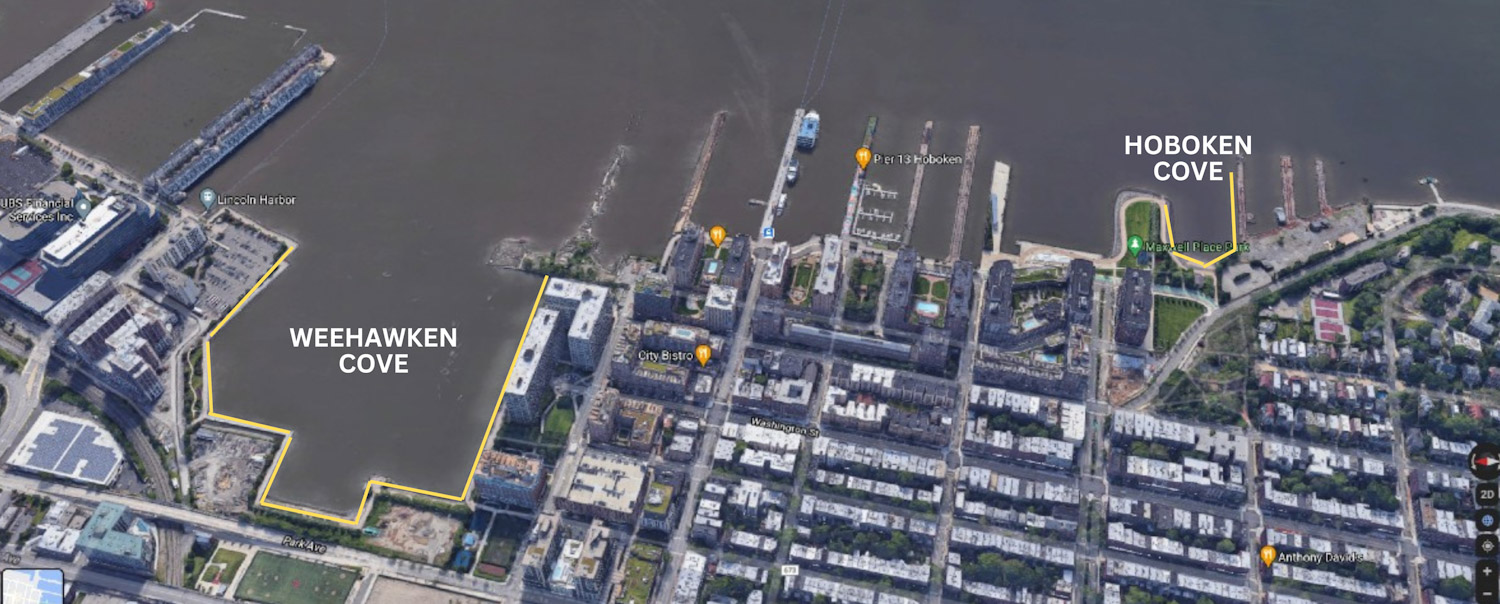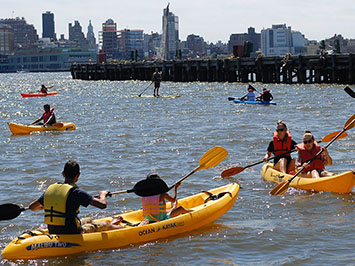
FBW | July 25, 2023
A beach and boathouse in Hoboken have been a haven for paddlers but there is a need to expand
If you are seeking to get out on the Hudson River via kayak, standup paddleboard or sailing dinghy, beware of the swift currents and shifting tides. Launching your boat also poses a problem as most of the river has a hard edge — bulkheads of concrete, steel or wooden cribbing. Fortunately, part of Hoboken’s waterfront has provided the answer to these problems.
The natural sand beach in Maxwell Place Park at Hoboken’s north waterfront is the only beach on either side of the Hudson River south of the George Washington Bridge. The protected inlet is bounded by an earthen peninsula to the north and a long pier to the south, making for a safe, manageable area for human-powered boating. Today, it is a hub for paddlers eager to access the Hudson River. Each weekend during the summer, scores of people line up for their turn to venture into the river via kayak, stand-up paddleboard or outrigger canoe.
The nonprofit Hoboken Cove Community Boathouse was founded in 2004. In that year, they offered just a few weekends for free kayaking near the beach in the protected inlet. By 2008, the boathouse was built just above the beach where kayaks, paddles and life-jackets could be stored.
Today, the Hoboken Cove Community Boathouse, Ke Aloha Outrigger and Resilience Paddle Sports provide boating opportunities each weekend throughout the summer for thousands of people who come from near and far. The Hudson River’s water quality has come a long way since the passage of the Clean Water Act in 1972, and its rich ecosystem is thriving, making the boating experience even more appealing.
With the ever-growing popularity of these programs, the boathouse is far too small to hold all the kayaks needed. Also, there is not enough room in the boathouse to store the invaluable outrigger canoes, weighing hundreds of pounds and measuring up to 45 feet long. Currently, they sit outside in the open at risk to damage and vandalism.
Yet, Hoboken has another protected inlet, an expansive 22-acre water area, that could accommodate all of these programs and more. It is the Weehawken Cove. This year, construction is slated to begin on a new park on the cove’s western shoreline, an integral part of the Hudson River Rebuild by Design Project. Original plans for this park included a second boathouse.
This could also provide an opportunity for a new group, the Hoboken Community Sailing Center, which is promoting outings on small sailing dinghies. They have used the Weehawken Cove for sailing their boats but due to lack of access, launching there has been difficult.
“Ours is the largest free paddling program in New Jersey,” remarked Oscar Hernandez, a Community Boathouse board member. “It has been growing each year and the opportunity to expand into the Weehawken Cove would meet a pressing need.” Hernandez suggested that the City could build a dock at the Weehawken Cove designed specifically for launching kayaks and other non-motorized craft.
Noelle Thurlow and her Resilience Paddle Sports group are currently situated on Pier 13 just north of the Hoboken Cove and a few blocks south of the Weehawken Cove. In addition to kayaking tours, Noelle, a biologist, has provided a series of opportunities to educate school-age children about the marine wildlife in the area. Having a space at the Weehawken Cove to continue her work would help to preserve a valuable resource.
Ke Aloha Outrigger provides a unique experience for the public to paddle in their outrigger canoes. The preservation of the Polynesian traditions and culture, plus a deep concern for the river environment and the threat of climate change, are central to their mission. They have also brought international recognition to Hoboken as a center for outrigger paddling regularly hosting visiting paddlers from Europe, Asia, South America, Australia, New Zealand, Hawaii and the Pacific Islands. Several years ago, in a late-night caper, one of their canoes was hijacked and set loose in the Hudson River, causing irreparable damage. Providing safe storage for these special vessels is critical.
The many volunteers who participate in these organizations enjoy a special sense of community. All of the organizations are stewards of the beach area and help to keep it clean and free of (mostly plastic) litter that washes up.
The City of Hoboken owns Maxwell Place Park and the Hoboken Cove Community Boathouse. They also own the land at Weehawken Cove where the new park will be built, supported by a generous grant from the State of New Jersey.
For the next three to five years, NY Waterway will be leasing the Union Dry Dock property just south of the Hoboken Cove for its ferry maintenance facility. The increased ferry traffic and diesel fumes are concerning for the boating community. Being able to shift much of this activity to the Weehawken Cove would provide a safer, cleaner alternative while the ferry company is leasing this site.
Organization Links
Hoboken Cove Community Boathouse
Ke Aloha Outrigger
Resilence Paddle Sports
Hoboken Community Sailing Center
Related Links
City of Water Day 2023 – Saturday, July 15
The public expresses concerns about environmental, safety and oversight issues as Board approves ferry facility
Construction of a long-awaited waterfront park at the Weehawken Cove will begin next spring
The life and potential death of the Hoboken Cove
3,000-year old outrigger canoe tradition lives on at the Hoboken Cove

